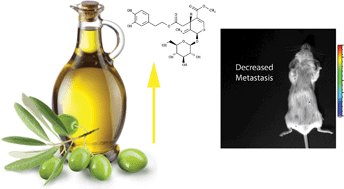Virgin olive oil phenolics extract inhibit invasion of HT115 human colon cancer cells in vitro and in vivo
Abstract
The decreased cancer risk associated with consumption of olive oil may be due to the presence of phenolics which can modulate pathways including apoptosis and invasion that are relevant to carcinogenesis. We have previously shown that a virgin olive oil phenolics extract (OVP) inhibited invasion of HT115 colon cancer cells in vitro. In the current study we assessed the in vitro effects of OVP (25 μg mL−1) on HT115 cell migration, spreading and integrin expression. Furthermore, the anti-metastatic activity of OVP – at a dose equivalent to 25 mg per kg per day for 2, 8 or 10 weeks – was assessed in a Severe Combined ImmunoDeficiency (SCID) Balb-c mouse model. After 24 h OVP did not inhibit cell migration but significantly reduced cell spreading on fibronectin (65% of control; p < 0.05) and expression of a range of α and β integrins was modulated. In vivo, OVP by gavage significantly (p < 0.05) decreased not only tumour volume but also the number of metastases in SCID Balb-c mice. Collectively, the data suggest that – possibly through modulation of integrin expression – OVP decreases invasion in vitro and also inhibits metastasis in vivo.

- This article is part of the themed collection: VI International Conference on Polyphenols and Health

 Please wait while we load your content...
Please wait while we load your content...